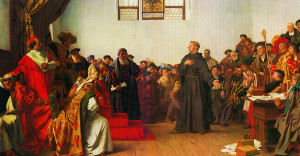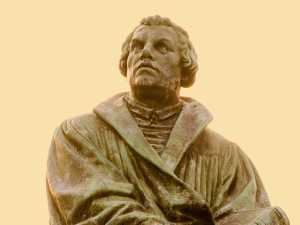by Rev. Matthew Zickler
 Those who have read Luther’s public writings might have a certain perception of what they would expect his other works to look like. In these public writings, Luther took on such opponents as the pope, the Anabaptists and Zwingli among others. In these works, Luther often gets the reputation for being hard-nosed, no nonsense, and earthy. And he certainly was those things. However, Luther was also a very prolific writer of private letters as well. In these letters one can glimpse Luther as a theologian with a noticeably gentler, pastoral bent. While I would argue that Luther’s public writings flow from the same pastoral heart, from fierce pastoral desire to defend the sheep from the wolves, the letters that Luther wrote don’t generally come from the same need to defend God’s people from the public attacks of the evil. They often come from a pastor protecting one of the individual sheep of God’s flock.
Those who have read Luther’s public writings might have a certain perception of what they would expect his other works to look like. In these public writings, Luther took on such opponents as the pope, the Anabaptists and Zwingli among others. In these works, Luther often gets the reputation for being hard-nosed, no nonsense, and earthy. And he certainly was those things. However, Luther was also a very prolific writer of private letters as well. In these letters one can glimpse Luther as a theologian with a noticeably gentler, pastoral bent. While I would argue that Luther’s public writings flow from the same pastoral heart, from fierce pastoral desire to defend the sheep from the wolves, the letters that Luther wrote don’t generally come from the same need to defend God’s people from the public attacks of the evil. They often come from a pastor protecting one of the individual sheep of God’s flock.
Perhaps the most of famous of these letters is well-known because of a phrase many have heard attributed to Luther without context: the letter in which Luther wrote to Philipp Melanchthon telling him to “sin boldly.” Without context, that can sound like Luther is condoning sin. However, what Luther is doing as a pastor is to comfort Melanchthon, who was in despair over a particular sin. In that sin, Luther reminded Melanchthon that he should desire to see himself as a sinner, because that’s who Jesus came to save. To conclude that thought Luther told Melanchthon to sin boldly, to recognize his sins as strong, but to let his faith in Christ be stronger. Christ is greater than his sins and Luther wanted Melanchthon to always remember that.
 However, Luther wrote many, many other letters, a selection of which we actually have available in the collection “Luther: Letters of Spiritual Counsel.”[1] In this selection we can get a glimpse of Luther’s insight on numerous topics, including Luther’s comfort for the sick and dying, his consolation for the bereaved, instructions for the perplexed and doubting, and admonitions to steadfastness and courage.
However, Luther wrote many, many other letters, a selection of which we actually have available in the collection “Luther: Letters of Spiritual Counsel.”[1] In this selection we can get a glimpse of Luther’s insight on numerous topics, including Luther’s comfort for the sick and dying, his consolation for the bereaved, instructions for the perplexed and doubting, and admonitions to steadfastness and courage.
To give some insight into the things that Luther said in these letters as well as the Table Talks included in this work, he had occasions where someone had questioned whether they were one of the elect of God. What did Luther say? He said that we should rely on God’s promises in Baptism, the Word, and the Sacrament, saying, “I have been baptized. I believe in Jesus Christ. I have received the Sacrament. What do I care if I have been predestined or not?”[2] His point was that we should be certain of what God says He will do for us in His Word – giving in that Word the promises of Jesus work for us on the cross. Elsewhere, Luther speaks again of this certainty to someone wrestling with doubt. He says, “It would be most foolish of God to give us his Son and the Scriptures and the prophets if he wished us to be uncertain and to doubt concerning our salvation.”[3]
 We can also grasp some understanding of Luther’s relationship to his wife Katie through his letters. As Luther traveled later in his life, his health was failing and Katie was quite worried about him. To these anxieties, Luther responded, “I have a better worrier than you and all the angels. He lies in a cradle and clings to a virgin’s breast, and yet he is at the same time seated at the right hand of God the Father Almighty. Therefore, be satisfied. Amen.”[4]
We can also grasp some understanding of Luther’s relationship to his wife Katie through his letters. As Luther traveled later in his life, his health was failing and Katie was quite worried about him. To these anxieties, Luther responded, “I have a better worrier than you and all the angels. He lies in a cradle and clings to a virgin’s breast, and yet he is at the same time seated at the right hand of God the Father Almighty. Therefore, be satisfied. Amen.”[4]
In our current situation, one of the most intriguing sections of the book might be what Luther has to say about the relationship between the Church and the state. Luther publicly taught about “the two kingdoms”: the Kingdom of the Right (for brevity’s sake we will here call it the Church) and the Kingdom of the Left (again, for brevity, we will give it the shorthand name of the state). We can also get an idea of this from his letters to various rulers, magistrates, and even pastors who served under various sorts of rulers. For example, in light of the Obergefell vs. Hodge decision, do churches have the right to comment as to whether the Supreme Court was correct in deciding as they did? Luther would say so: “For although it is a divine institution, God has reserved [for preachers] the right to punish vices and correct wrongs…” There is a limit, though, for these servants of the Kingdom of the Right: “But it is not proper for a preacher to prescribe measures and say at what price bread, meat, etc., should be sold and valued. In general, pastors should instruct every man in terms of his calling in order that he might do, diligently and faithfully, what God has commanded.”[5]
 Such examples give an idea of what Luther’s more casual writings were like, and you can see how the Word of God and the Gospel of our Lord Jesus Christ were at the heart of his entire life. With that in mind I would encourage any Christian to read Luther, even Luther’s letters, as devotional material, understanding that through them we may gain a depth of understanding what our Lord Jesus has done for us.
Such examples give an idea of what Luther’s more casual writings were like, and you can see how the Word of God and the Gospel of our Lord Jesus Christ were at the heart of his entire life. With that in mind I would encourage any Christian to read Luther, even Luther’s letters, as devotional material, understanding that through them we may gain a depth of understanding what our Lord Jesus has done for us.
The Rev. Matthew Zickler is pastor of Grace Lutheran Church, Western Springs, Ill.
[1] Luther, Martin, and Theodore G. Tappert. Letters of Spiritual Counsel. Philadelphia: Westminster Press, 1955. Print. The Library of Christian classics, v. 18; Library of Christian classics (Philadelphia, Pa.), v.18.
[2] Ibid, p. 122
[3] Ibid, p. 131
[4] Ibid, p. 106.
[5] Ibid, p. 336.
